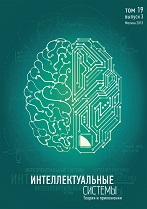|
|
Intelligent systems. Theory and applications, 2021, Volume 25, Issue 2, Pages 23–45
(Mi ista301)
|
 |
|
 |
This article is cited in 1 scientific paper (total in 1 paper)
Part 1. General problems of the intellectual systems theory
The adverse clinical outcome risk assessment by in-depth data analysis methods
B. E. Gornyia, A. P. Ryjovb, A. S. Strogalovb, A. D. Zhuravlevb, A. A. Khusaenovb, I. A. Sherginb, D. A. Feshchenkoa, A. M. Abdullaeva, A. V. Kontsevayaa
a National Medical Research Center for Therapy and Preventive Medicine
b Moscow State University
Abstract:
The adverse events in the medical care providing process occurs in 10-15% of hospitalized patients. Even a few percent reducing of such events will save thousands of lives. One of the ways to solve this crucial problem is the usage of intelligent information technologies that allow the predicting of an unfavorable clinical outcome risk in patients. The paper presents the study results carried out jointly by the scientist of the National Research Center for Therapy and Preventive Medicine of the Ministry of Health of the Russian Federation and the the scientist of Faculty of Mechanics and Mathematics of the Lomonosov Moscow State University, showing the applicability of data analysis methods in this important problem solving.
Keywords:
preventive medicine, adverse clinical outcome, in-depth data analysis.
Citation:
B. E. Gornyi, A. P. Ryjov, A. S. Strogalov, A. D. Zhuravlev, A. A. Khusaenov, I. A. Shergin, D. A. Feshchenko, A. M. Abdullaev, A. V. Kontsevaya, “The adverse clinical outcome risk assessment by in-depth data analysis methods”, Intelligent systems. Theory and applications, 25:2 (2021), 23–45
Linking options:
https://www.mathnet.ru/eng/ista301 https://www.mathnet.ru/eng/ista/v25/i2/p23
|

| Statistics & downloads: |
| Abstract page: | 144 | | Full-text PDF : | 79 | | References: | 31 |
|




 Contact us:
Contact us: Terms of Use
Terms of Use
 Registration to the website
Registration to the website Logotypes
Logotypes








 Citation in format
Citation in format 
